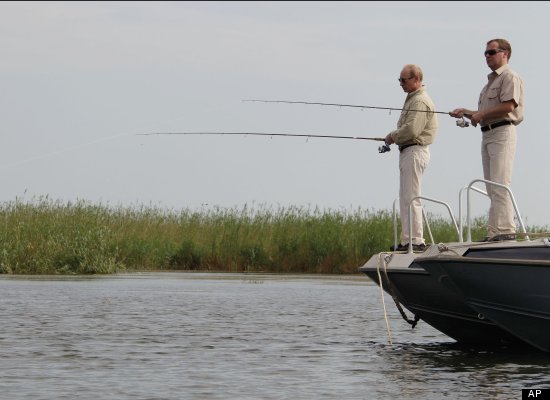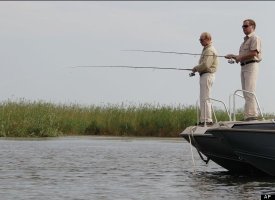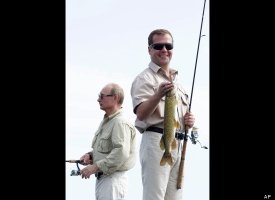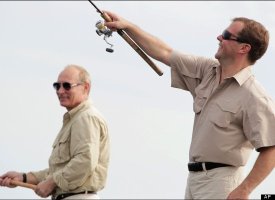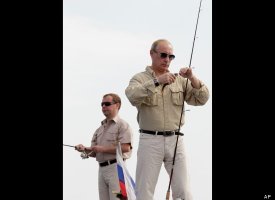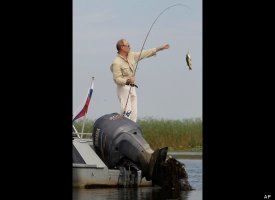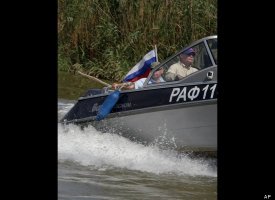Dmitry Medvedev, Russia President, Says Missiles May Target U.S. Missile Defense Sites
VLADIMIR ISACHENKOV 11/23/11 10:40 AM ET 
MOSCOW — If Washington continues to ignore Russia's demands about a proposed U.S. missile shield in Europe, Russia will deploy new missiles aimed at it and put arms control on hold, President Dmitry Medvedev said Wednesday.
The tough statement reflected a growing strain in U.S.-Russian ties, despite President Barack Obama's campaign to "reset" American relations with the Kremlin, which were strained by years of tensions over U.S. foreign policy and the 2008 Russian-Georgian war.
Medvedev said he still hopes for a deal on the U.S. missile shield, but he strongly accused the U.S. and its NATO allies of ignoring Russia's worries.
The U.S. has repeatedly assured Russia that its proposed missile defense system wouldn't be directed against Russia's nuclear forces, but Moscow has demanded legally binding assurances, and Medvedev did that again on Wednesday.
He warned that Russia will station missiles in its westernmost Kaliningrad region and other areas, if the U.S. continues its plans without giving Russia firm legal guarantees that the shield isn't directed at its nuclear forces.
The U.S. missile defense dispute has long tarnished ties between Moscow and Washington. The Obama administration says the shield is needed to fend off a potential threat from Iran, but Russia fears that it could erode the deterrent potential of its nuclear forces.
"If our partners tackle the issue of taking our legitimate security interests into account in an honest and responsible way, I'm sure we will be able to come to an agreement," Medvedev said. "But if they offer us to `cooperate,' or, to say it honestly, work against our own interests, we won't be able to reach common ground."
Moscow has agreed to consider a proposal NATO made last fall to cooperate on the missile shield, but the talks have been deadlocked over how the system should be operated. Russia has insisted that it should be run jointly, which NATO has rejected.
Medvedev also warned that Moscow may opt out of the New START arms control deal with the United States and halt other arms control talks, if the U.S. proceeds with the missile shield without meeting to Russia's demand. The Americans had hoped that the START treaty would stimulate progress in further ambitious arms control efforts, but such talks have stalled over tension on the missile plan.
While the New START doesn't prevent the U.S. from building new missile defense systems, Russia has said it could withdraw from the treaty, if it feels threatened by such a system in future.
Medvedev reaffirmed that warning Wednesday, saying that Russia may opt out of the treaty because of an "inalienable link strategic offensive and defensive weapons."
The New START has been a key achievement of Obama's policy of improving U.S. relations with Moscow, which had suffered badly under George W. Bush administration.
The U.S. plan calls for placing land- and sea-based radars and interceptors in European locations, including Romania and Poland, over the next decade and upgrading them over time.
Medvedev said that Russia will carefully watch the development of the U.S. shield and take countermeasures, if Washington ignores Russia's concerns. He warned that Moscow would deploy short-range Iskander missiles in Kaliningrad, a Baltic Sea region bordering Poland, and place weapons in other areas in Russia's west and south to target U.S. missile defense sites.
Medvedev added that such Russian strategic nuclear missiles also would be fitted with systems that would allow them to penetrate prospective missile defenses.
He and other Russian leaders have made similar threats in the past, and the latest statement appears to be aimed at domestic audience ahead of Dec. 4 parliamentary elections.
Medvedev, who is set to step down to allow Prime Minister Vladimir Putin to reclaim the presidency in March's elections, leads the ruling United Russia party list in the parliamentary vote. A stern warning to the U.S. and NATO issued by Medvedev seems to be directed at rallying nationalist votes in the polls.
Regarding Russia's demands, Medvedev said: "When we propose to put in on paper in the form of precise and clear legal obligations, we hear a strong refusal. We won't agree to take part in a program, which in a comparatively short period – five, six or may be eight years – would be capable of weakening our deterrence potential."
Medvedev's envoy to NATO, Dmitry Rogozin, said at a news conference that the Kremlin won't follow the example of Soviet President Mikhail Gorbachev and take unwritten promises from the West.
"The current political leadership can't act like Gorbachev, and it wants written obligations secured by ratification documents," Rogozin said.
Medvedev's statement was intended to encourage the U.S. and NATO to take Russia seriously at the missile defense talks, Rogozin said.
"We won't allow them to treat us like fools," he said. "Nuclear deterrent forces aren't a joke."
_____
Nataliya Vasilyeva in Moscow contributed to this report.
(This version CORRECTS New approach. Corrects spelling of "Dmitry" in the first paragraph.)
Below, see photos of President Medvedev fishing with Vladimir Putin:
__._,_.___
